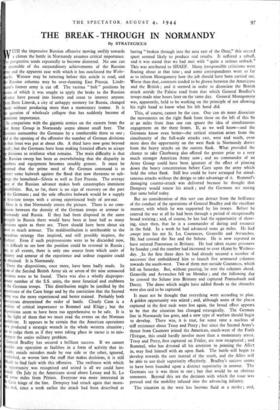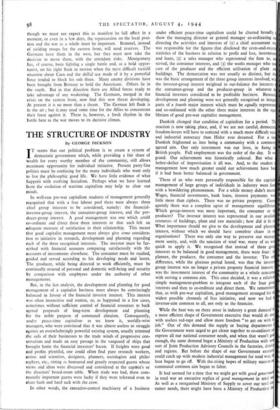THE BREAK - THROUGH IN NORMANDY
By STRATEGICUS
ITH the impressive Russian offensive moving swiftly towards a climax the battle in Normandy assumes critical importance. e perspective tends repeatedly to become distorted. No one can insensible of the extraordinary achievements of the Russian y and the apparent ease with which it has outclassed the Wehr- elm Warsaw may be tottering before this article is read; and
e Russian columns may be over-funning East Prussia. Linde- ann's former army is cut off. The various " bolt " positions by cans of which it was sought to apply the brake to the Russian vance have passed into history and cease to interest anyone. en Brest Litovsk, a city of unhappy memory for Russia, changed nds without producing more than a momentary tremor. It is e question of wholesale collapse that has suddenly become of minent importance.
In comparison with the gigantic armies on the eastern front the st Army Group in Normandy setTas almost small beer. The ssians outnumber the Germans by a comfortable three to one ;
d at the opening of the offensive the number of German divisions that front was put at about itio. A third have now gone beyond call; but the Germans have been making frenzied efforts to scrape divisions to reinforce what remains. The main difficulty is that e Russian sweep has been so overwhelming that the disparity in mbers and equipment becomes steadily greater. It must be sumed that the prime need of the German command is to store some bulwark against the flood that now threatens to sub- erge the homeland—Silesia as well as East Prussia. The average e of the Russian advance makes both catastrophes imminent ssibilities. But, so far, there is no sign of recovery on the part the Germans ; and the sole effective bulwark would be a supply first-rate troops with a strong experienced body of amour. Here it is that Normandy enters the picture. There is no com- ison between the density of the German troops or armour in ormandy and Rtissia. If they had been disposed in the same rength in Russia there would have been at least half as many visions again as there are. There should have been about six es as much armour. The maldistribution is attributable to the zardous strategy that inspired, and still possibly inspires, the ehrer. Even if such prepossessions were to be discarded now, is difficult to see how the position could be restored in Russia ; t, at all events, there is only one source from which units of fanny and armour of the experience and ardour requisite could obtained. It is Normandy.
There the dispositions, once more, have been badly made. In ont of the SecOnd British Army six or seven of the nine armoured visions were to be found. There was also a wholly dispropor- nate number of the S.S. units, the most fanatical and stubborn the German troops. This distribution might be justified by the ponance of the Caen hinge and by the conviction that the Second my was the more experienced and better trained. Probably both evictions determined the order of battle. Clearly Caen is a sition of critical importance to Rommel and Kluge ; but the spositions seem to have been too apprehensive to be safe. It is the light of them that we must read the events on the Norman ttlefront. It appears to be certain that the American operations ye produced a strategic wrench in the whole western situation ; t to judge them as if they were taking place in vacuo is to mis- terpret the entire military problem.
General Bradley has secured a brilliant success. If we cannot scribe any operation as faultless in a form of activity that in- itably entails mistakes made by one side or the other, ignored, 'erlooked, or woven '-mto the stuff that makes decisions, it is still knit to find fault with this offensive. The swiftness with which °Pportunity .was recognised and seized is all we could have shed. On July 25 the Americans stood above Lessay and St. Lo some miles from Periers. Everyone was more interested in e Caen hinge of the line. Dempsey had struck again that morn- ; and, since a week earlier the attack had been described as
having " broken through into the area east of the Orne," this second spurt seemed likely to produce real results. It suffered a rebuff, and it was stated that we had met with " quite a serious setback." This was attributed to SHAEF. Many irresponsible criticisms were floating about at that time ; and some correspondents went so far as to inform Montgomery how the job should have been carried out. Worse than that, contrasts tended to be brawn between the Americans and the British ; and it seemed in order to dissociate the British attack astride the Falaise road• from that which General Bradley's troops made nine hours later on the "same day. General Montgomery was, apparently, held to be working on the principle of not allowing his right hand to know what his left hand did.
This, of course, cannot be the case. One can nb more dissociate the movements on the right flank from those on the left of this So or go miles front than one can ignore the idea of simultaneous engagement on the three fronts. If, as we well know—and the Germans know even better—the critical situation arises from the simultaneity of the full-scale attacks east, west and south, even more does the opportunity on the west flank in Normandy derive from the heavy attacks on the eastern flank. What provided the chance to take Cherbourg also offered the greater prize to a very much stronger American Army now ; and no commander of an Army Group could have been ignorant of the effect of pinning down the heavy concentration before Caen upon the army which held the other flank. Still less could he have arranged for simul- taneous attacks without the design to take advantage of it. Rommel's damaging counter-attack was delivered because he thought that Dempsey would renew his attack ; and the Germans are stating that same belief today.
But no consideration of this sort can detract from the brilliance of the conduct of the operations of General Bradley and the excellent manner,. with which he was supported by his troops. Before he entered the war at all he had been through a period of exceptionally broad training ; and, of course, he has had the opportunity of show- ing, since then, that he is a commander of daring and resource in the field. In a week he had advanced some 4o miles. He had „swept into his net St. Lo, Coutances, Granville and Avranches. He, had crossed the See and the Selune. He is now reported to have entered Pontorson in Brittany. He had taken fo,000 prisoners by Sunday ; and the number had increased to over 18,o0o by Wednes- day. ,In the first three days he had already secured a number of successes- that emboldened him to launch five armoured columns towards the south-west. Two of them met outside Coutances, which fell on Saturday. But, without pausing, he sent the columns ahead. Granville and Avranches fell on Monday ; and the following, day he crossed the Selune into Brittany and captured Pontaubault and Ducey. The dams which might have added floods to the obstacles were also said to be captured.
It must not be thought that everything went according to plan. A golden opportunity was seized ; and, although some of the places captured in the first rush were lost again, the broad effect appears to be that the situation has changed strategically. The German line in Normandy has gone, and a new type of warfare should begin to develop. There was, it is true, for some time a nucleus of stiff resistance about Tessy and Percy ; but since the Second Army's thrust from Caumont joined the American, south-west of the Fork l'Eveque, this could hardly involve more than a momentary arrest. Tessy and Percy, first captured on Friday, are now recaptured ; and Rommel, who has devoted all his attention to penning the Allies in, may find himself with an open flank. The battle will begin to develop towards the east instead of the south, and the Allies will be able to use their superiority effectively. Bradley's success seems to have been founded upon a distinct superiority in armour. The Germans say it was three to one ; but that would be an obvious comment. Beyond this are the decision with which the issue was pressed and the mobility infused into the advancing infantry.
The situation in the west has become fluid at a stroke ; and, though we must not expect this to manifest its full effect in a moment, or even in a few days, the repercussion on the local posi- tion and the war as a whole must be important. Rommel, instead of yielding troops for the eastern front, will need reserves. The Germans have them in the west, but they must now take the decision to move them, with the attendant risks. Montgomery has, of course, been fighting a single battle and, as a bold oppor- tunist, set his right flank in motion when the most difficult tactical situation about Caen and the skilful use made of it by a powerful force tended to block his exit there. Many _enemy divisions have been brought from Brittany to hold the Americans. Others lie in the south. But in that direction there are Allied forces ready to take advantage of any weakening. The Germans, merged in the crisis on the eastern front, now find this new threat developing. At present it is no more than a threat. The German left flank is in the air ; but it,may need some time for the Allies to concentrate their force against it. There is, however, a fresh rhythm in the battle here as the war moves to its decisive climax.



























 Previous page
Previous page